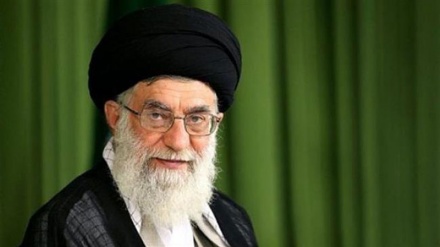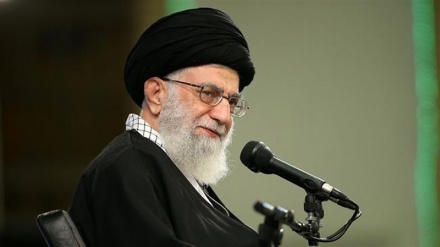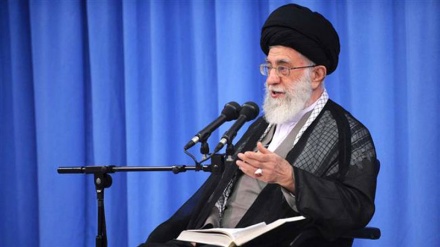In Presence of the Sun (74)
Welcome to the program. In this episode we are going to touch on the issue of freedom of expression with a focus on the viewpoints of Ayatollah Khamenei.
Freedom in Islam means being released from everything and everyone other than God. Tolerance of the criticism and the words of the opponents and welcoming the views of the people and media by the state will have positive impacts on the progress of society. Today “freedom of expression” is a very beautiful motto being heard in many countries. But are people free in all of these countries?
Ayatollah Khamenei describes freedom as a quintessential issue among the innate and primary rights of human being which is not given by governments to their citizens but a “bounty bestowed by God”. Thus, when we look at freedom as a divine bounty we will understand that it has a status and value which should be observed just like other bounties not to lead it to extremes.
Freedom of expression, as a branch of freedom in general, plays a significant role in the enlightenment and guidance of individuals and society. In view of the Leader of the Islamic Revolution freedom of expression stems from freedom of thought. Once there is freedom of thought in a society and the elite are able to produce thought and idea easily it will yield freedom of expression. Ayatollah Seyyed Ali Khamenei strongly believes that freedom of expression differs from verbal insult and chaos in expression. He says, “The remedy for diseases and insults and putting check on the cultural confusion is that freedom of expression and production of opinion are internalized and supported within the framework of law and Islam respectively.”
Freedom of expression in Islam is quite different from what is prevalent in the west or east. Leader of the Islamic Revolution opines that just as freedom in Islam means freedom from everything other than God, freedom of expression falls within the same category. In his view this type of freedom means having no fear of expressing the word of truth so that the weakest individual in society is able to address the highest and most powerful person at the ruling class. Ayatollah Khamenei notes, “One of the major manifestations of freedom and justice is when an individual from the lowest stratum of the society, once he is wronged, is able to stand before the Imam of Muslims and the highest official of the country to fulfill his right without stuttering. Some consider this impractical. We feel that maybe they don’t have enough trust in Wilaya and the atmosphere of Wilaya; otherwise they wouldn’t consider the topic of justice-seeking against freedom-seeking while freedom-seeking is in justice-seeking. If justice is internalized in a society the rights of individuals and freedoms will be safeguarded.”
Elsewhere in his remarks, the Leader states, “That the nations shouldn’t be the captive of carnal desires and fear of oppressive powers is a prescription which can be implemented equally and is the panacea for all nations. It means internal freedom and spiritual freedom is the freedom from the chains that hinder man’s movement.”
The Leader of the Islamic Revolution elaborates on freedom of expression, “If a word from a speaker is released in a climate and environment and under conditions with audiences which will cause misleading of a group of people; this is prohibited in Islam. The reason and philosophy of this prohibition is clear; for freedom is basically for guidance of thoughts, growth of thoughts and progress of society. The freedom which causes misleading of thoughts, causes stagnation of thoughts, causes retrogression of society; this is certainly not acceptable. Thus, one of the boundaries of freedom is deception and misguidance. Any word which is misleading and confusing the hearts and minds is prohibited. One of the boundaries is public tension in society. In Qur’an there is a clear reason on public tension in surah Ahzab which reads, ‘If the hypocrites and those in whose hearts is a sickness and the rumourmongers in the city do not relinquish, We will surely urge you against them.’
Expression is free but if a person wants to disturb the calm atmosphere of the society and the environment of coexistence of the people of this society Islam will never accept this. So, the establishments will be duty-bound to stand against such an expression and prosecute it legally and politically. This is not acceptable. This is also one of the boundaries of freedom. Therefore, expressing opinion is different from instigation of chaos.”
What is important is that Islam has reprimanded keeping silent when it is necessary to speak. The Leader says in this regard, “Islam has another characteristic and that is Islam has forbidden non-expression in some cases. It means that not only expression is permitted but also non-expression is forbidden. In some cases one should speak; i.e. where the concealment of truth is against the expediencies of the Islamic system and the growth of the social thought. In such a case it is obligatory and concealment of truth is forbidden. This is another characteristic of Islam about which there are many ayahs in Qur’an. Look at the ayahs of concealment in Qur’an. You will see that expression and presentation of truth is necessary in some cases and this is the real guarantee for staying of the system on the path of Islam. It means if the officials are going to deviate from the path of Islam and move on an erroneous way; if the fate of the Islamic system is threatened by a deviation from the Islamic bases here the duty is something else. Here expression of truth is obligatory and bidding what is good and forbidding what is evil is necessary. Disclosing realities for the people is necessary. The collection of these things clarifies Islam’s view on the issue of expression and freedom of expressing opinion.”
RM/SS


